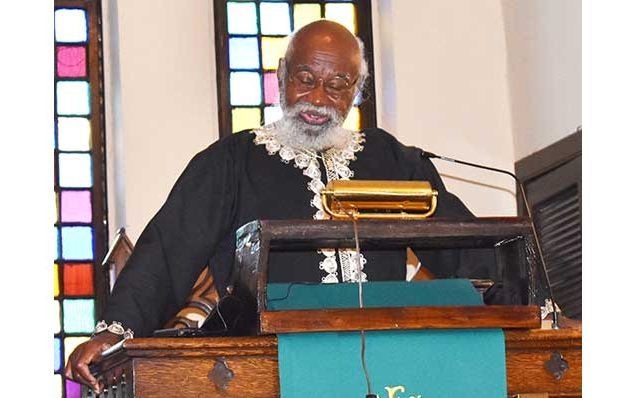Farmville council renames street for Rev. J. Samuel Williams Jr.
Published 7:30 pm Saturday, June 24, 2023

- The Rev. J. Samuel Williams Jr., a minister who was among the students who walked out with Barbara Rose Johns in 1951, is seen here delivering the keynote during a mass meeting to commemorate milestones related to education and civil rights. (Photo by Emily Hollingsworth)
|
Getting your Trinity Audio player ready...
|
FARMVILLE – They all thanked Rev. J. Samuel Williams Jr. Each member of the Farmville Town Council voted in unison during their Wednesday, June 14 meeting, wanting to honor the Civil Rights icon and local pastor who has been part of the life of three local churches, now serving at Levi Baptist Church in Farmville.
“Thank your sir, for your service to this community for so many years,” Farmville Mayor Brian Vincent said to Williams, who was in the crowd.
The group honored Rev. Williams by renaming Watkins Street to Williams Way. Watkins is right off of High Street in Farmville and is the place where Rev. Williams still lives.
The idea had been introduced a week before, during the council’s work session. Farmville Town Manager Dr. Scott Davis said he had been contacted by Vice Mayor Reid to put this on the agenda to discuss, after members of Williams’ family had reached out, asking if something like this could be done. Reid said last week it was a long time coming.
“He’s a Civil Rights community icon, been around 80 years or more,” Reid said. “He was a past pastor of First Baptist and Beulah Baptist churches and a historian for Farmville. Now he’s pastor at Levi Baptist Church and involved in a number of programs.”
Taking a stand
When you look up major events in Farmville’s history, like the student strike in April 1951 or the downtown civil rights demonstrations in July 1963, you’ll find Rev. Williams.
On July 28, 1963, he prayed and sang hymns on the steps of Farmville Baptist Church. Organizing the latest in a series of student civil rights demonstrations in town, he helped bring almost 500 people together, with a goal of integrating downtown churches.
One portion of the group made it inside of Johns Memorial Episcopal Church, where they sat with then-Longwood University Dean Dr. C.G. Gordon Moss. Another portion of the group tried to worship at Farmville United Methodist Church and was rejected. After trying and being rejected again at Farmville Baptist Church, the group started to pray and sing hymns on the church steps. They were arrested and charged with “disturbing the public worship of God”, the first time that had happened after a “kneel-in” in the South.
More than a decade before those protests, Williams was part of another portion of Farmville history. He took part in the April 23, 1951 student strike at Robert Russa Moton High, alongside Barbara Rose Johns.
In a 2016 interview with The Herald, Williams described his time at Moton High School as being challenging and dark.
“We were trying to our way out of academic darkness,” Williams said, adding the students wanted to “(find) a way out of stereotypes.”
Moton High was the first free-standing segregated high school for African-American students in Prince Edward County. Originally built in 1939, its max capacity was to hold exactly 180 students, but had over 477. As such, there was overcrowding in the classrooms, along with subpar conditions and hand-me-down education materials.
The strike at Moton garnered the attention and support of NAACP lawyers Oliver Hill and Spottswood Robinson, and a suit sparked by the protest was filed under the name Davis v. Prince Edward. In 1954, that case became one of the five cases that the U.S. Supreme Court reviewed during the landmark Brown v Board of Education case, which ultimately declared segregation unconstitutional.
When will renaming happen?
Now this renaming won’t happen immediately, in order to help residents adjust. In fact, it won’t take effect until December of this year. That way the Post Office can be notified of the change and know where to deliver mail. Residents on the street can also use that time to change their address on everything from drivers’ licenses to Amazon accounts. The goal is to make the adjustment easy, so no packages get lost or other issues come up.





